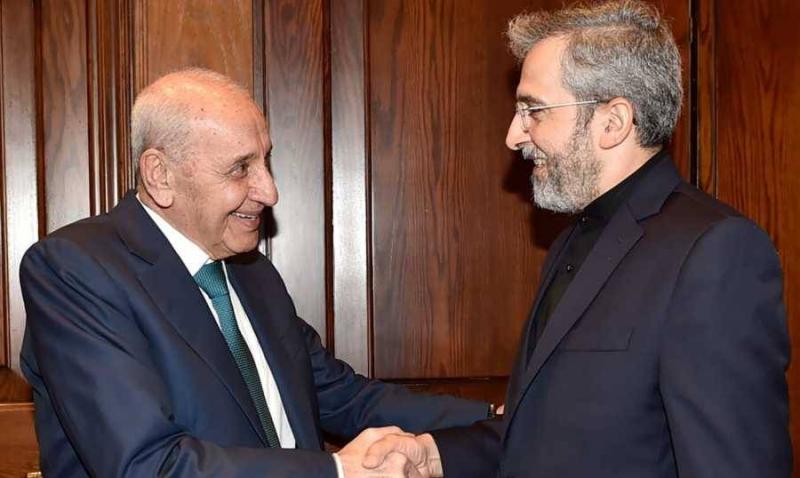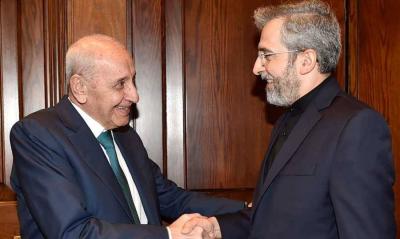Hezbollah is taking the threats issued by Israeli Prime Minister Benjamin Netanyahu and his war team regarding the expansion of the conflict along the northern front in southern Lebanon seriously. It will not remain idle, as it has publicly announced the full mobilization of its fighters, who are now fully prepared to confront Israeli threats, even though it does not seek war, a senior source in the Shiite duo told "Asharq Al-Awsat." The party's strikes into Israeli territory are a response to Israel's targeting of areas in the depths of northern and western Bekaa, and this has been communicated successively to senior Lebanese state officials and to the UNIFIL forces, who have been continuously interacting with the party's leadership and the components of Netanyahu's war in monitoring the escalating situation in the south, occasionally relaying messages between Tel Aviv and the party.
Political sources revealed that the escalation on the southern front between Hezbollah and Israel, occurring in a gradual and unprecedented manner, is part of the reactions to the escalation in Gaza, as both parties are resorting to military confrontation to improve their positions in case American-Egyptian-Qatari mediation leads to a ceasefire on the Gaza front, hoping it will automatically extend to the southern front. The sources stated to "Asharq Al-Awsat" that Iran remains committed to its position of not expanding the war, harmonizing with the pressures exerted by the United States on Israel to prevent such an expansion and to adhere to the initiative launched by U.S. President Joe Biden.
Political sources confirmed that Iran's reluctance to expand the war was a major agenda point in the meetings held by its acting foreign minister, Ali Baqari Kani, during his first visit to Beirut, which included meetings with Speaker of Parliament Nabih Berri, Prime Minister Najib Mikati, Minister Abdullah Bou Habib, Hezbollah Secretary-General Hassan Nasrallah, and leaders of Palestinian factions belonging to the Resistance axis. He expressed satisfaction with the course of the ongoing war on the Gaza front and the ability of Hamas and Islamic Jihad to withstand the Israeli aggression. Sources quoted Baqari as saying that Hamas still retains over 80 percent of its weapon stockpile and that it has only utilized about 15 percent in its defense against the Israeli attacks thus far.
The selection of Baqari to visit Beirut as his first stop after being appointed as acting foreign minister, following the late Hossein Amir Abdollahian, reflects Iran's desire to assert its presence in the heated situation stretching from Gaza to southern Lebanon and its commitment to support Lebanese and Palestinian factions in the Resistance axis in confronting Israeli aggression. This move aims to send a message confirming that Iran's role in the region cannot be ignored if a settlement is reached that redraws its political landscape.
Baqari is thus seeking to gather as many cards as possible to present at the Iranian-American negotiations hosted by Oman, along with Switzerland, represented by its ambassador in Tehran, conveying messages between the two sides if necessary. In this context, sources noted that Tehran is not interested in engaging in a political clash with Washington, which strengthens their harmony on not expanding the war, a point of convergence despite their differing views on Iran's role in the region. They asserted that Iranian leadership is betting on creating a favorable atmosphere to restore recognition of the nuclear agreement it signed with former U.S. President Barack Obama (2015), which was annulled by his successor, former President Donald Trump. Consequently, they prefer to see the current president, Joe Biden, reelected, believing that a supportive stance from him would pave the way for reviving the agreement.
Thus, Tel Aviv continues to threaten the expansion of the war southward to retaliate against Hezbollah, enabling Netanyahu to regain his stature domestically and creating conditions for the repatriation of displaced individuals to their settlements near the Israeli-Lebanese border. However, this Israeli threat has soon been relayed by several Lebanese officials through visiting Western envoys, warning of Netanyahu's potential to expand the war at the beginning of July, adhering to his pledge to return displaced persons before September with the onset of the academic year in these settlements.
Nevertheless, this threat, according to political sources, remained within the framework of warnings and calls to reduce tension in the south and did not carry an Israeli ultimatum. Minister Bou Habib confirmed this to "Asharq Al-Awsat," stating that Lebanon has not received any Israeli warning from the ambassadors of the United States, France, and Britain, or any other accredited diplomats in Lebanon, all of whom advocate for prioritizing diplomatic solutions and efforts, which is what we prefer and work towards in our communications to restore calm to the south by implementing UN Resolution 1701, which mandates Israel to adhere strictly to the ceasefire agreement and to stop its violations of Lebanese airspace.
A critical question arises regarding how Hezbollah will react to Israeli threats and Washington’s position on the matter, especially since U.S. mediator Amos Hochstein occasionally communicates with Speaker Berri, waiting to reach a ceasefire in Gaza to resume his efforts between Beirut and Tel Aviv to promote the agreement he prepared to de-escalate the situation on the southern front.
Hezbollah, according to political sources, is carefully assessing its response to Israel and will not engage in escalating confrontations, persisting in its determination not to be dragged into an expanded war, as Lebanon cannot afford to be involved in an open conflict whose starting point is known but whose end point cannot be predicted. This coincides with Iran's insistence that Hezbollah's support for Gaza does not spiral out of control, to avoid a comprehensive and unpredictable confrontation that would contradict the role Tehran currently plays as a regulator of the ongoing conflict between the Resistance axis, with its Lebanese and Palestinian forces, and Israel. This situation could complicate Iran's ability to leverage the Lebanese card politically when the time for a regional settlement arrives, assuming external conditions are conducive to achieving it, at least in the foreseeable future.




